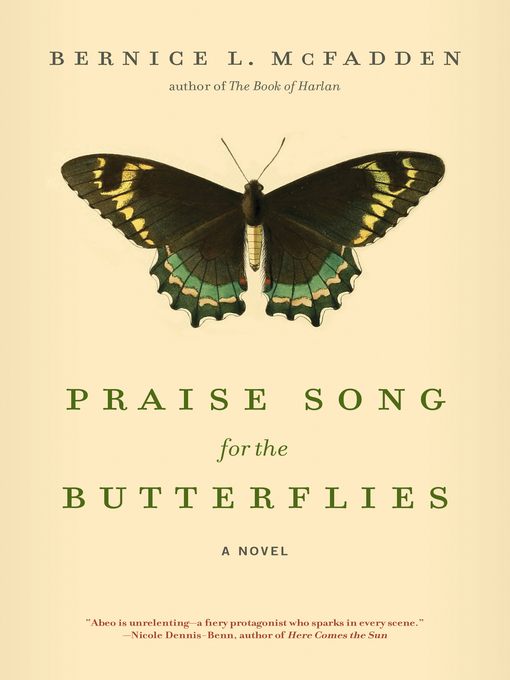
Praise Song for the Butterflies
کتاب های مرتبط
- اطلاعات
- نقد و بررسی
- دیدگاه کاربران
نقد و بررسی

June 15, 2018
A child's shocking experience of ritual servitude.Young Abeo lives in an affluent, urban neighborhood in the fictional African nation of Ukemby. With a spacious home, loving parents, and a baby brother she adores, Abeo is leading a happy and secure childhood. She even has an enchanting Aunt Serafine, who visits from the U.S. and introduces her to worldly delights like Big Mac sandwiches. Before her tearful farewell to Serafine, Abeo takes a ring from her aunt's collection of bangles and beads, hoping that together with her earnest prayers, the ring will draw Serafine back to Ukemby. It is a childish plan, but Abeo is soon convinced that her secret misdeed is the cause of the horrific shift in her life. The reader knows better, as do the adults around her who instigate, ignore, or are impotent to help when a trusted adult delivers Abeo to a fetish priest at a distant village shrine to become a trokosi, a female slave. It's an astonishing and desperate act, meant to appease the gods, following old traditions, after Abeo's father is accused of wrongdoing. But there is nothing holy at the shrine. The obscenities inflicted upon Abeo and the other young girls held captive are profound and inhumane. Back-breaking work, a near-starvation diet, beatings, and rapes--it's hard to keep reading as Abeo experiences loss after loss, but it would be a mistake to put the book down. Though Abeo's childhood, body, and, finally, her spirit are destroyed, McFadden's often riveting prose keeps the reader turning pages. Several plot twists, such as the revelation of Abeo's parentage, seem wedged in, but in the end, the promise of seeing Abeo survive the tragic theft of her childhood makes up for the lack of a more nuanced plot.An engrossing novel that truly is a praise song for survivors everywhere.
COPYRIGHT(2018) Kirkus Reviews, ALL RIGHTS RESERVED.

July 30, 2018
McFadden’s latest (after The Book of Harlan) is the harrowing saga of young Abeo Kata, whose pleasant childhood during the late 1970s in the fictional West African town of Port Masi, Ukemby, takes an abrupt, dark turn. Abeo is indulged by her parents and an aunt visiting from New York, but her life changes trajectory after her rural grandmother moves in and forces outdated customs on the family. Shortly thereafter, Wasik, Abeo’s father, has a spate of financial woes and his mother insists that abandoning Abeo at a shrine is the only way to alleviate his troubles. Wasik is horrified by the prospect but reluctantly follows his mother’s advice, driving several hours in the night to deliver the terrified nine-year-old into ritual servitude. Abeo plunges into grueling work in the fields alongside other children of varying ages. Abeo’s mother attempts to locate her daughter, but learns there are countless shrines tucked away in remote villages. During the years that Abeo is enslaved, she relies on memories for comfort before she is finally freed. After her release, Abeo completes a rehabilitation program before beginning to mend her tattered past. Abeo’s journey is challenging and stirring, punctuated by an excellent supporting cast of characters and McFadden’s lyrical prose. This moving novel should appeal to a wide audience.

September 1, 2018
As a little girl, Abeo Kata lived contentedly with her parents in the fictional West African country of Ukemby. But in the opening pages of this new work from the multi-award-winning McFadden (The Book of Harlan), Abeo is a mature young woman living in New York and wrestling with a lost childhood that began when her family's fortune faltered. Encouraged by her grandmother, Abeo's father offered Abeo in servitude to a traditional religious shrine as a way to atone for transgressions a family member may have committed. Girls submitted to this practice, known as trokosi, must withstand hard labor for the shrine and become sexual slaves of the shrine's fetishistic priest. As Abeo recalls enduring these deplorable conditions and finally gaining her freedom through the intervention of a nonprofit agency dedicated to rehabilitating former sexual slaves, she struggles to overcome 15 years' worth of rape, beatings, and forced pregnancy. VERDICT Heartbreaking yet ultimately redeeming, this strong survivor's tale is told with unadorned prose and a well-paced plot. Abeo's story is compelling, but seeing how the adults in Abeo's life rationalize their betrayal is even more horrifically fascinating. Recommended, especially as an introduction to a lesser-known cultural practice that has become widely criminalized.--Faye Chadwell, Oregon State Univ., Corvallis
Copyright 2018 Library Journal, LLC Used with permission.

























دیدگاه کاربران